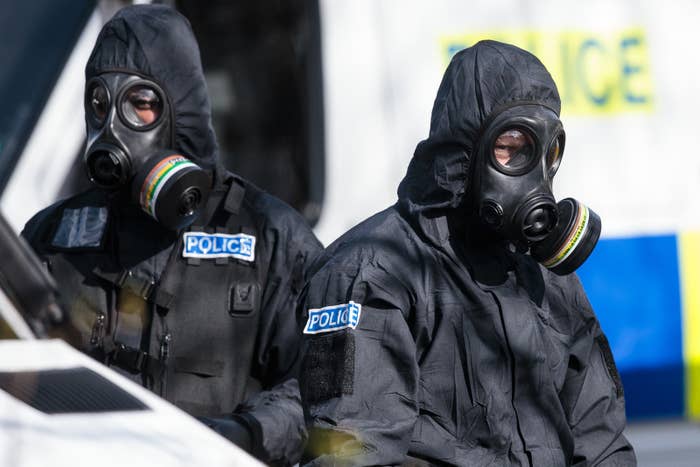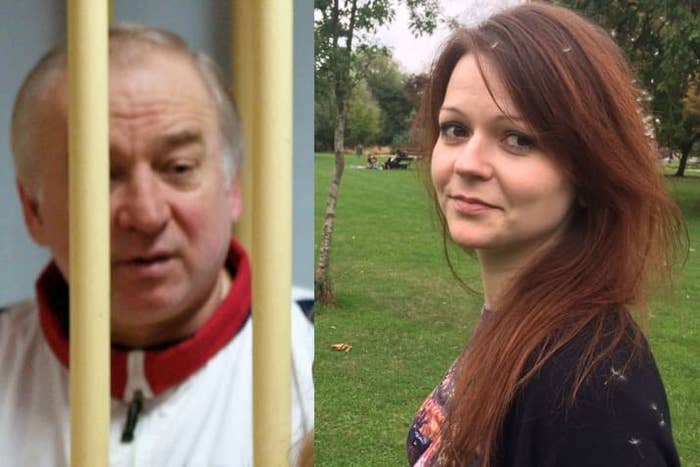
The British government has set out its most detailed explanation yet of why it believes Russia is responsible for the attempted assassinations of former Russian spy Sergei Skripal and his daughter, Yulia.
Sir Mark Sedwill, the prime minister's national security adviser, said Russia had been testing nerve agents on door handles – which is how police suspect the pair were poisoned – and email accounts belonging to Yulia Skripal had been targeted by Russian intelligence as far back as 2013.
In a letter to NATO secretary general Jens Stoltenberg on Friday, Sedwill said: "We therefore continue to judge that only Russia has the technical means, operational experience and motive for the attack on the Skripals and that it is highly likely that the Russian state was responsible. There is no plausible alternative explanation."
It comes a day after the global chemical weapons watchdog, the Organisation for the Prohibition of Chemical Weapons (OPCW), confirmed the UK's findings that the Skripals were poisoned by the Novichok nerve agent in Salisbury on 4 March.
Sergei Skripal remains in hospital in serious condition, while Yulia Skripal has been released. A police officer, detective sergeant Nick Bailey, was inadvertently poisoned after tending to the pair, but was released from hospital on 22 March.
In the letter, Sedwill said Novichok was found in environmental samples taken at the scene and in biomedical samples from both Skripals and DS Bailey, and that the "highest concentrations were found on the handle of Mr Skripal’s front door".
He said: "A combination of credible open-source reporting and intelligence shows that in the 1980s the Soviet Union developed a new class of ‘fourth generation’ nerve agents, known as Novichoks.
"The key institute responsible for this work was a branch of the State Institute for Organic Chemistry and Technology at Shikhany near Volgograd. The codeword for the offensive chemical weapons programme (of which Novichoks were one part) was FOLIANT.
"It is highly likely that Novichoks were developed to prevent detection by the West and to circumvent international chemical weapons controls. The Russian state has previously produced Novichoks and would still be capable of doing so."

Sedwill said Russia’s chemical weapons programme had continued after the collapse of the Soviet Union, and that by 1993, when Russia signed the Chemical Weapons Convention, it was "likely that some Novichoks had passed acceptance testing, allowing their use by the Russian military".
"Russia further developed some Novichoks after ratifying the convention," he said. "In the mid-2000s, President Putin was closely involved in the Russian chemical weapons programme.
"It is highly unlikely that any former Soviet republic (other than Russia) pursued an offensive chemical weapons programme after independence. It is unlikely that Novichoks could be made and deployed by non-state actors (eg a criminal or terrorist group), especially at the level of purity confirmed by OPCW."
Turning to "operational experience", Sedwill said Russian had a "proven record of conducting state-sponsored assassination".
He pointed to the Owen report from the UK’s public inquiry into the death of Aleksandr Litvinenko which concluded in 2016 that he was "deliberately poisoned with Polonium 210, that there was a ‘strong probability’ that the FSB (Russia's security agency) directed the operation, and that President Putin ‘probably approved it’".
He said Owen had said other cases between 2002 and 2006 suggested that the "Russian state may have been involved in the assassination of Mr Putin’s critics". And Sedwill added that since 2006, there "have been numerous suspected Russian state-sponsored assassinations outside the former Soviet Union".
Turning to how exactly nerve agents are used by Russia, Sedwill said: "During the 2000s, Russia commenced a programme to test means of delivering chemical warfare agents and to train personnel from special units in the use of these weapons.
"This programme subsequently included investigation of ways of delivering nerve agents, including by application to door handles. Within the last decade, Russia has produced and stockpiled small quantities of Novichoks under the same programme."
Finally, on the motive, Sedwill said Sergei Skripal was a former Russian military intelligence (GRU) officer, convicted of espionage in 2004.
"It is highly likely that the Russian intelligence services view at least some of its defectors as legitimate targets for assassination," he said.
"We have information indicating Russian intelligence service interest in the Skripals, dating back at least as far as 2013, when email accounts belonging to Yulia Skripal were targeted by GRU cyber specialists."
Calling on NATO to take action, he concluded: "I know that NATO will remain seized of the need to confront the increasingly aggressive pattern of Russia behaviour of which the attack in Salisbury was an acute and recent example."
